Those who were in Foxboro but never won it all on disappointment, the Brady-Belichick ratio, the assumption that they all have rings and more.
The conversation is a familiar and often uncomfortable one. Nearly identical versions can be recounted by star linebackers and backup offensive linemen alike; high-round draft picks and free agents who made a fleeting stopover in Foxboro; those who won a ring somewhere else and those who never would.
Anyone who had even the proverbial cup of coffee—Dunkin’ Donuts, to be sure—with the Patriots during Bill Belichick and Tom Brady’s 20-year NFL marriage is almost certain to encounter the assumption that they, too, won one of the dynasty’s six Super Bowl titles. But for those who were there during the often-forgotten nine-year championship drought, responding to a well-meaning conversation starter about rings can be awkward ...
“I was supposed to have one.” Or, “I was one of those teams who got there but didn't quite get there.” Or, “Oh, no, I was on the ’07 team ... Then, all of the sudden, it gets real remorseful.”
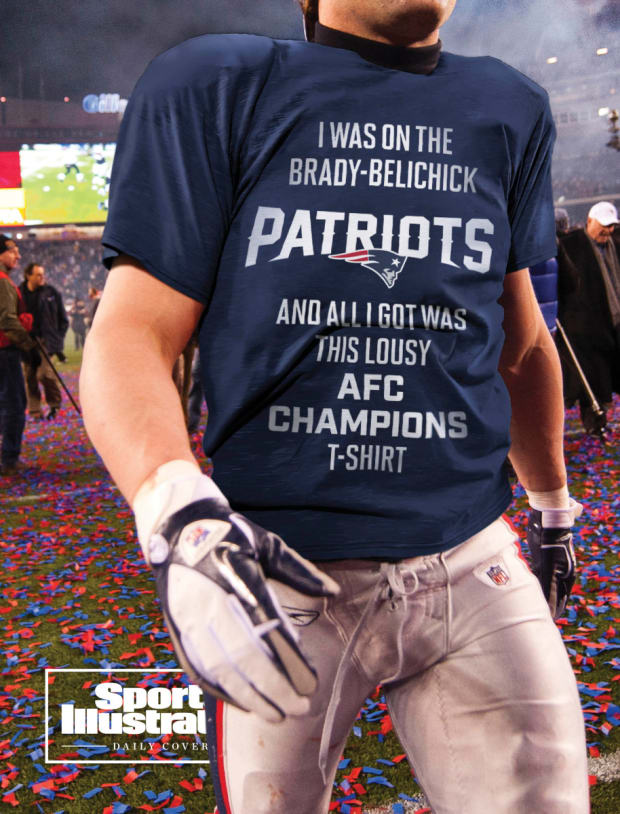
The Patriots’ championship “drought” was shorter than others clubs’ postseason droughts, but it was long enough to constitute the tenures of countless stalwarts—like, for instance, Wes Welker, still the franchise’s all-time leader in receptions, or linebacker Adalius Thomas, who signed one of the richest free-agent deals of the Belichick era. Or Logan Mankins, an All-Pro in New England who Bill Belichick once called the best guard he’d ever coached, but whose Patriots tenure spanned, precisely, the nine-year gap: 2005–13.
“It actually bothers me,” says Ross Tucker, Mankins’s Patriots teammate from 2005 to ’06 (Mankins declined an interview request). “Think about the guys that were on injured reserve or practice squad on some of these other six [Patriots] teams who have Super Bowl rings, and Logan Mankins doesn’t. He started well over 100 games for them!”
There are 168 players who played in Foxboro only during the championship drought. We asked a dozen of them about the Patriot Way, postseason disappointment (David Tyree!), the Brady-Belichick ratio and, simply, life in the gap years.
Editor’s note: Some of the quotes contained in this story were edited for clarity. Ben Baskin contributed reporting and Reid Foster contributed research to this story.
A run of three Super Bowl titles in four years (2001–04 seasons)—thought to be a near-impossible task in the salary-cap era—established the Patriots as a modern NFL dynasty. And by the mid-aughts, New England was a popular destination for free agents ...
BRANDON LLOYD, WIDE RECEIVER (2012): The Super Bowl was the only reason I went there, to play with Tom and to get on that stage. You assume that they're going to go to the Super Bowl. And my 10th year in the NFL, I had never played in a playoff game before.
SHAWN SPRINGS, DEFENSIVE BACK (2009): When the opportunity came up to leave Washington, it was between the Saints and New England. I was training in Arizona, and on my flight to New England for [a free-agency visit] is Sean Payton. We landed in Dallas and he said, C'mon man, Gregg Williams told me all about you. I can get you on the plane. Come with me and we'll make it work. I'll call your agent, I'll call Eugene [Parker]. I was like, Oh, dude, I'm headed to Boston now. And the funny thing about that: New Orleans won the Super Bowl that year. But I was going to play with Tom. I knew he was coming off a knee [injury], but there's like a 50-50 chance you're going to go to the Super Bowl playing with Tom Brady, right?
DONTÉ STALLWORTH, WIDE RECEIVER (2007, 2012): When I came to New England, they were coming off of the 2006 AFC championship game against the Colts. The Patriots were up 21–6 at halftime, and they should have won that game and went on to another Super Bowl. It was a no-brainer once I became a free agent: New England is going to go to the Super Bowl, or be Super Bowl contenders, every single year. I was 26, fresh off of my rookie contract, and, like a lot of people, I was looking at that like it was a golden opportunity.
RYAN O’CALLAGHAN, OFFENSIVE LINEMAN (2006–07): If you have someone like Tom on your team, that tends to be a magnet for other good free agents. We got [Randy] Moss. We got Junior Seau. We got—oh goodness, what was his name, that really good outside linebacker, he came over from Baltimore ... Adalius Thomas!
ADALIUS THOMAS, LINEBACKER (2007–09): I went there for the opportunity to compete in Super Bowls, more than anywhere else, more than anywhere else.
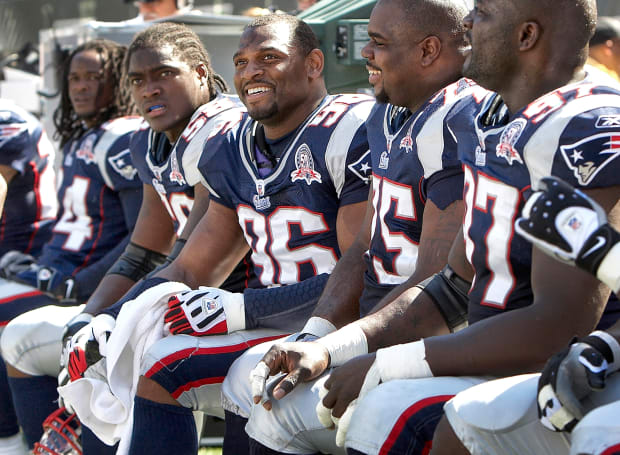 Adalius Thomas (middle)
Adalius Thomas (middle)
STALLWORTH: Wes was the first one to sign [in the 2007 offseason]. I had no idea who Wes Welker was. I just knew that I was in talks with New England, so I called my agent, and asked, What does this mean? Is New England out of the picture now? Because I really wanted to go to New England and play with Brady and play under Belichick. He said, no, Wes is a slot guy and you're mostly outside, so it's a perfect match. I ended up going on my visit there. Nick Caserio was the wide receivers coach that year. Josh McDaniels was the offensive coordinator. When we got into the team room, we were able to watch film, and Josh was showing me how he envisioned me in that offense. He was showing me about Wes. And he was saying that they're thinking about grabbing another receiver, because they wanted to throw the ball around a lot, is what he told me in so many words. I didn't know that guy was going to be Randy Moss. From the moment that we traded for Randy, we understood, this team is meant to win the Super Bowl.
LLOYD: The previous year [2011], I had been traded to St. Louis to play with Josh McDaniels [then the Rams offensive coordinator who rejoined the Patriots after the 2011 season]. I showed that I could run that offense without a quarterback like Tom. That offseason, I wasn't even entertaining any other offers. I was playing with Tom.
SPRINGS: It was the first day of free agency, March 1, and they had a snowstorm in Boston. So they couldn't come pick me up to bring me to Foxboro to one of the hotels. So they basically booked me a hotel at the Boston airport. The next morning they came and picked me up. It was early because I think I had to get a physical or something. Then I had a meeting with coach—Bill—at 9. So I was at the facility at 7:15 or 7:30, right? Tom was already there in the quarterbacks meeting room watching tape. I’ll never forget what he was watching; he was actually watching the Giants Super Bowl, the David Tyree game. He was sitting in the quarterback room by himself, 7:30 on March 1. It was a blizzard the night before. They had 18 inches, and he was in there. So I knew from Day One. I still had to go to Philly [for a free-agent visit], but I was going to cancel the New Orleans visit because I gotta play with this guy.
ROSS TUCKER, OFFENSIVE LINEMAN (2005–06): I have an interesting perspective because I started a couple games for Buffalo in ’03 and ’04 against the Patriots, when they won those back-to-back Super Bowls. And then in ’05, I got signed by them and was there until I got traded to Cleveland in ’06. I think what jumps out to me in particular about ’05, which is the start of [the gap], is the sense I got being there that they were a very beat-up, tired team. It felt like they were worn down. It's really hard to play that many extra games. The reason why they signed me was Matt Light, their best offensive lineman, got hurt. Dan Koppen, their second-best offensive lineman, got hurt. I think playing in that many games, that many years in a row, took its toll on them. It’s probably part of the reason why nobody’s ever won three Super Bowls in a row. It’s just a physical and mental hurdle that's very, very hard to overcome.
For new arrivals, it wasn’t long before the Patriot Way—the intensity of practices and attention to detail—became clear...
ELLIS HOBBS, CORNERBACK (2005–08): When we went to the AFC championship against the Colts [in 2006], we didn't really have a prolific offense. Defense was O.K. We were just very good at what we did. But if you had looked at us, in our eyes, we were the tops in everything that we were doing, and we were gonna go out there and play our hardest, and damn near came away with the win. Confidence doesn't come from talking about or scaring your opponent. It comes from you knowing that you've done everything possible to put yourself in a position to win consistently. And that's what we did on a daily basis.
LLOYD: They shouldn't have won that many Super Bowls. Bill wins with situational football. The players aren’t that talented. It’s the discipline. It’s how those practices were at such a high level. We practiced situational moments. When it came to going no-huddle, we were already in shape because there were no breaks in practice. So when it came to running—having a shot play from our side of the field that crosses the 50 and goes into the red zone and then changing the personnel and just going right up to the ball and snapping it and catching the defense trying to get on their big guys in to stop the run. ... Like, that was practice. On other teams, we have to set aside specific periods in practice to work on that. That’s what separated the Patriots.
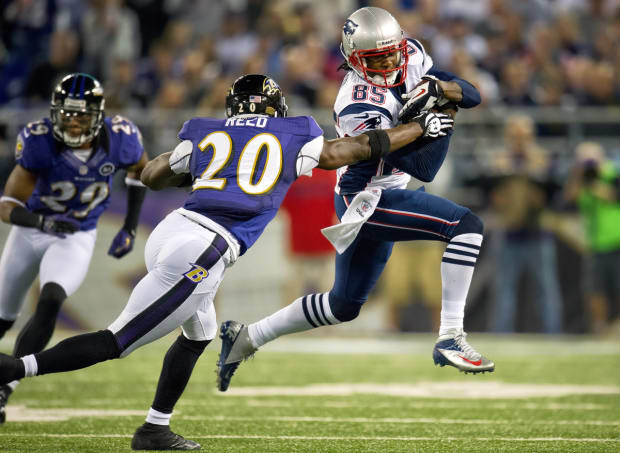 Brandon Lloyd
Brandon Lloyd
RICH OHRNBERGER, OFFENSIVE LINEMAN (2009–11): I remember watching the undefeated team when I was still at Penn State and just being in complete awe of what they accomplished. But then when you join the Patriots, it becomes very routine. Like you realize, wow, there's a mathematics to this. Math looks like magic until you learn the formulas, and so that was how it was for me. It's something you're in awe of from an outsider's perspective. But once you walk through the doors and you see how the sausage is made, you're like, O.K., yeah, I could do that. I'll do that. And you just do it.
LLOYD: People will absolutely hate Tom’s guts because he beats their favorite team. When I tell them the off-the-field stories ... what an amazing man he is, how thoughtful he is as a friend. When we met, it was like, Damn, yeah he is definitely the flyest dude ever. But then getting on the practice field it was like this switch that went on. It was like everything full speed. It was just the level of intensity at which he prepared and played. The first week of training camp, it was like, Yup, this is intense. Damn, this is good.
OHRNBERGER: Once you were there for a couple of years, you realized there was this great revolving wheel of routine. Belichick talked about the same things, or similar things at the same times of the year, every single year. I remember I was sitting next to Stephen Neal, who had been with the team for maybe eight or nine years at the time. I was a rookie on the team, and I'm feverishly taking notes of every last word [Bill] is saying. And then I stopped because Steve was distracting me. When I looked over at him, he was literally muttering under his breath the exact words with the exact inflection that Bill Belichick was using. So clearly, this was a rote speech. To me, it was new and it was valuable information. And I'm scribbling it down like a rookie would and should. But repetition, like everybody knows, creates great habits.
STALLWORTH: It’s always about winning the next one. Not focusing on anything other than the next game, the next meeting, the next practice. Belichick would break it down like that. And we became like these little Belichick robots where he programmed us to think that way and to operate in that mindset.
HOBBS: Looking back on it now in hindsight, we would win pretty significant games, but it was just like another day in the office. And you would literally hear people say that. I remember many times, talking to my financial adviser at the time, letting him know, Hey, just go ahead and rack up at least two more playoff checks, because we're gonna get there. Tedy [Bruschi], he would play certain songs after games. “Another One Bites the Dust.” It almost felt like it was too complacent of a norm. Don't get me wrong: We had bigger goals, bigger dreams. But if you ever played in the NFL, you know how difficult it is. And so for them to even win three Super Bowls, that’s amazing in itself. I just think when you get to that level, and you’re consistently winning, it’s very, very difficult to keep the energy up. But at the same time, as you’re winning, because you’ve had that extreme high, nothing is satisfying anymore. Except that that last high, which is winning the Super Bowl.
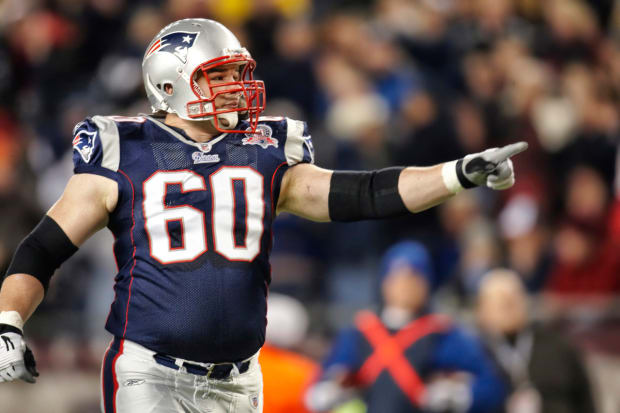 Rich Ohrnberger
Rich Ohrnberger
There was also some fun along the way. Early in the 2007 season, Belichick asked comedian and actor Lenny Clarke to address the team after a tense few practices. “People don’t realize how funny he is,” Clarke says. “He is f------ hysterical.” The Patriots had just been punished for the Spygate scandal—including a $500,000 fine for Belichick and $250,000 for the franchise—and Clarke had instructions to roast the coach first. “I had this little video camera in my hand. I said, ‘You know, they say a picture is worth a thousand words. Evidently this is worth a quarter of a million dollars. Who is the f------ idiot that didn’t hit delete?’”
O’CALLAGHAN: We had Vinny Testaverde one year [2006, when Testaverde turned 43]. Every week Belichick would give a schedule, usually before a road game, and we would go over the schedule. People would read it line by line just so everyone knew where the hell they had to be and when. And he called on Vinny to read one of the lines of the schedule, and Vinny had to lean down, go into his—I’ll call it his briefcase, whatever little bag he carried to meetings—and he had to get his reading glasses. Belichick had some fun with that.
OHRNBERGER: I’m a little bit of a ham; I like to entertain people. Throughout my time with the Patriots, when Belichick thought we needed a little bit of an emotional boost, he would just put me in front of the team and be like, Hey, Rich, you got a story for us? When I was on IR, I did these cut-ups of my teammates' interviews, and I used the Patriots’ in-house production team to help me edit. And then I would appear as this running character, interviewing them, but I wasn’t actually interviewing them. I was cutting in wildly inappropriate questions, and then we would play the clip of their answer to an actual interview question. I released my last one on-site in Indianapolis, when we were there for Super Bowl [XLVI] week. While everybody else is preparing for the game, I'm running around cutting footage with a fake mustache on as a pretend reporter, making a vignette for the team to watch before the game. Who knows, maybe that’s the reason why we lost, because everybody was just laughing so hard they couldn't sleep. Belichick doesn’t get enough credit for his sense of humor. The guy likes to laugh; he really did have an appreciation for levity, and he leaned into it.
After beating the Eagles in Super Bowl XXXIX after the 2004 season, the Patriots fell short of the Super Bowl in two straight years; those championships went to a couple of high-powered AFC rivals: Pittsburgh and Indianapolis. Heading into the 2007 season, the Patriots loaded up on offensive talent and ended up shattering records in a historic season, perfect until Super Bowl XLII.
WES WELKER, WIDE RECEIVER (2007–12): ’07 was the best team I've ever seen. We were [at Super Bowl Media Day], and I don’t think I even had a booth at that time. That's how good we were.
HOBBS: For us to do that for 16 weeks in the regular season, that was amazing, right? But then when you get to the playoffs, there's this kind of numbing or sobering factor of, none of that matters. It just turns into pressure now, because you do all that to lose, and it's for nothing. If I could take it back, I would much rather have lost in the regular season to kind of get that jolt, or that reset button that we needed. I remember Bill asking us after the AFC championship game, “Can you win one more?” I don’t know why that sticks with me. But I think that’s how everyone felt, that this was exhausting. And for him to say that “one more,” it would be like training in the summertime, and you've already done 15 gassers, and can you give me one more? Like you're on your last leg. Whether he did it purposely or subconsciously, I think that was his way of saying like, man, I’m tired, too.
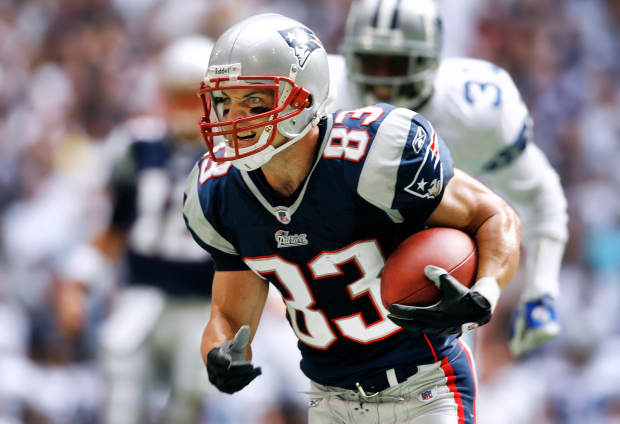 Wes Welker
Wes Welker
ADALIUS THOMAS: I remember things going their way all throughout [the game]. From me getting a sack to a caused fumble, and they picked it up on third down. The opportunity I had, touching the back of Eli [Manning]’s jersey for one second, kind of circling around and thinking he's in the grass, and then him coming out of the grass [to throw The Catch]. The dropped interception from Asante [Samuel] on the sideline that would end the game. You have all these different things that go through your head, that could have changed the outcome of the game. There's probably so much more that I don’t remember. I've never watched the game as a whole over again. I don't think I'll ever watch it again.
HOBBS: I got the pick [in the second quarter], and it’s like, man, we’re rolling. I felt like I was having one of the best games ever. I went back and watched the game, and my name is continually being called, and I don't know if I was on the cusp of like, MVP, but I definitely could have been in the running. Then we get to the end, and that whole series of events went so fast. There were so many things that you wish you could tweak a little bit or allow a second more thought, whether it was me individually, us as a team, the play call. There were two plays in that game when the timing was completely off.
DAVID THOMAS: You see Tyree go up, and Rodney Harrison was the one trying to break the pass up and at that point—I would've picked Rodney every time.
HOBBS: Me and Plaxico [Burress], we actually, we both looked back and said some explicit things. We turn around, and I look up, and I just see Eli Manning's shoulder pointed towards the lights. I’m like, what the hell is he doing? Who is he throwing it to?
DAVID THOMAS: Rodney made a great play. He had his arm between the guy’s hands and did everything you’re supposed to. Tyree found a way to hang on.
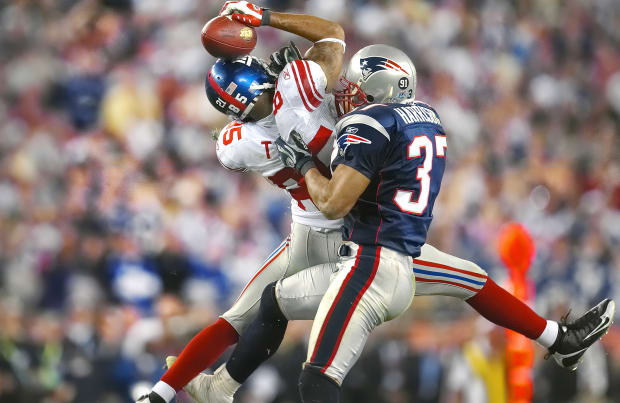
A few plays later, Manning threw the game-winning TD pass to Burress. Hobbs, whose assignment was to guard Burress all game, was in one-on-one coverage ...
HOBBS: With that type of defensive call—it’s such a volatile defense, it's zero-blitz—if it doesn't hit the way that it's supposed to, the swing is very dramatic, out of your favor. When the timing didn’t work, I just knew it right away. They had seen that play time and time again from us. And they actually scored on it in Week 17 against us as well. And so I believe they knew that it was coming. Manning takes a sidestep. He launches it to the corner. Plax actually fakes the slant. It wasn't like a slant-and-go, it's kind of like a hesitation, and he took off. And I just freeze and wait for the inside route. Because the quickest way to the ball is the inside route, so I can’t let him inside. And so when I just flat-foot it like that, expecting the ball to come out, because I was ready to pick it again, it just left me in a very detrimental position. I'm fast, but I'm not that fast. He already knew where he was going. There was so much room to my right-hand side. Eli didn't even have to aim, he just threw it up. Plax ran under it. I thought, maybe he’ll drop it, but he didn’t.
STALLWORTH: Everyone was devastated, obviously. I mean, you talk about hearing a pin drop on the carpet. It was just completely silent [in the postgame locker room]. No disrespect to Bill, I was hearing him, but I really wasn't listening because the shellshock was still, like, this is not real. It was kind of like a slow-motion thing. But I did hear him say, he basically took all the blame for the loss. He said, I let you guys down. I didn't do a good job enough today. And, I'm sorry. I don't even remember when that actually registered, maybe later that evening or the next day, but I just remember thinking like, holy shit. Like, this is a team game. And he's preached that from the very first day I've been there. It's the Super Bowl, but for us and for the league and for history and for sports, it just wasn't another Super Bowl. It was history, where a team had an opportunity to do what no one has done before and probably—probably—will never do. The Chiefs may be able to do it. But everything was riding on that game. And he took sole blame for that.
HOBBS: You would think it was this overwhelming sadness, but because of how I carried myself throughout my entire career, how I played, what I did leading up to that game, what I did in that game, and how I just left everything out there, I was fully satisfied. Was I satisfied with the play call or anything like that? No, that sucked. Losing? No, absolutely not. But I was O.K. I remember walking off the field and sitting down, and literally my first thought was, I can’t wait to get fixed. [Hobbs needed surgery for a torn shoulder and a double sports hernia.] It wasn’t happiness; I was definitely upset. But it wasn't it wasn’t as dramatic as you would imagine, or people would think. And I want to be very clear: It wasn’t that I didn’t care. It was just because I think it’s a very rare thing for normal people to understand that when you leave it all out there with no regrets, you literally have no regrets. I did everything that I could in my power and it just didn’t work out. And you move on.
ADALIUS THOMAS: I try not to think about it, because it's painful. It will haunt you for the rest of your life, to know that you were that close to being perfect, doing something that no other team had ever done in history. So that would be outstanding if you could.
WELKER: It was such a cool group, and such a unique thing, and it’s sad that it ended the way it did. But, you know, that’s life.

We appreciate you for reading our post, but we think it will be better you like our facebook fanpage and also follow us on twitter below.







